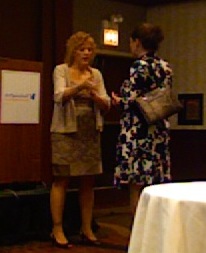May 5, 2010 1
The Big Takeaways Sesh at the MProfs B2B
Bob Knorpp of the Cool Beans Group kicked things off with “pay attention to the keywords you are using in social status updates.” If you are looking for additional SEO power and buzz, focusing on these status updates can have an impact based on the way these things are indexed (with an emphasis on the first six words).
Dave Thomas of SAS focused on the power of content and especially the importance of re-purposing the content you produce. He referred to Kirsten Watson’s (Kinaxis) practice of producing a white paper, first, then using that to produce blog posts, then creating a deck from that for Slideshare, and finally, interviewing the author to create a podcast. An audience member then told people not to forget about images which are, of course, indexed as well.
Stephanie Miller of Return Path recalled the advice that you should never test just to test, but always to use testing to prove out particular points.
Bob Knorpp shared the lesson that you should listen to your sales force to find out what kinds of content bring the best leads, then optimize for that content. It might sound obvious, he said, but it bears repeating because it gives you something very concrete to work with. (I found “improving the relationship between sales and marketing” one of the sub-themes of the entire forum.)
Dave Thomas echoed several speakers saying that it’s ok to take a hybrid approach and integrate your “traditional” marketing techniques with all the emerging tactics now available.
Stephanie Miller, finally, recalled an exercise used in one session where the speaker took the marketing messages of several competitors and showed that you could not tell the companies apart solely based on these messages, which were essentially the same. Compare your messaging to that of your competitors and prepare to have your eyes opened!
As part of a discussion about getting more people in your organization involved in social media, Bob Knorpp cautioned first that it may not be the case that everyone is actually going to be good at it (blogging, for example). So you should take people’s strengths into considerations before asking them to do something. He wanted people to remember that, frankly, if your organization is listening, then that is already a win.
There followed a discussion about the loss of control brought about my social media. It was acknowledged that this loss of control can certainly make some people nervous, and that this is a natural response in some cases, but that our role needs to be one of educating people on how to use these tools. In fact, we can create whole plans around it so that we have a framework within which to judge and evaluate our efforts.
The conversation then returned to the publishing metaphor especially in the context of Kipp Bodnar’s suggestion that your goal should be to produce the best-read magazine in your industry. Bob Knorpp took issue with the publishing metaphor and suggested that we use, instead, the “theme park” metaphor. “When people go to Disneyland, they don’t rave about the brochure, they rave about the experience,” as he put it.
Finally, I said that my big takeaway was that all this isn’t about the technology; it’s about the “soft stuff.” Marketing automation, lead management, social media engagement all boil down to human interactions. It’s these interactions that produce the processes that you automate, build trust between marketing and sales, and, ultimately, determine the role you play in the lives of your customers.
 SEO has become a recurring theme for me at this conference so I was very curious to check out
SEO has become a recurring theme for me at this conference so I was very curious to check out